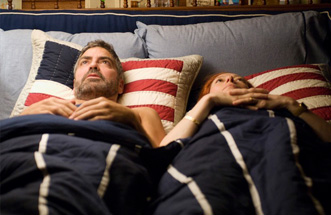Movie Review: Burn After Reading
By Matthew Huntley
September 17, 2008
Burn After Reading has a handful of laugh-out-loud scenes, each of which gets subdued by moments of inconsistency and sitcom-level humor. Such is the case for most Coen brothers' comedies.
More often than not, the Oscar-winning duo is capable of setting up the rarest and most unpredictable of comic situations, but they have trouble maintaining their initial momentum. After a while, the humor levels simmer down and we grow restless. If they shock or make us laugh hard once, we expect that same effect throughout. Not that Burn After Reading doesn't try. It's typical of many Coen brothers comedies in that it usually takes a second or third viewing for us to become fully engrossed in and appreciative of what it's doing.
The set up: A CIA agent named Osborne Cox (John Malkovich) gets demoted and quits his job out of spite. This gives his cheating wife, Katie (Tilda Swinton), all the more reason to divorce him. She's already been seeing a sleazy womanizer named Harry (George Clooney), who's married and works in the CIA treasury department. Harry carries a gun but loves to tell people he's never had to use it. He also brags about his inability to digest certain foods.
At the advice of her lawyer, Katie copies all of Osborne's classified files onto a CD to use as leverage. The CD gets left at a gym where a couple of dopey yet likable personal trainers, Chad (Brad Pitt, looking very James Dean-like) and Linda (Frances McDormand), get their hands on it and plan to use it as blackmail against Osborne.
Of course, there's a lot more to this bizarre and intertwining story than what I've just described, which cheerfully (and deservedly) sends up the spy thriller genre, most notably the films adapted from Tom Clancy novels. It also pokes fun at the people who take such stories too seriously by making the people involved a bunch of, as Osborne points out, "morons". Typical of Coen brothers' comedies, Burn After Reading is filled with eccentric, colorful characters, whose behavior goes extremely over-the-top (I dare you to even try and guess what Harry is building in his basement). There are also unexpected bits of romance; sudden bursts of violence; and a lot of frightened and bewildered looks.
I mentioned the satirical plot, but in a movie of this nature, it doesn't really matter what the plot is. What matters is how the actors inhabiting the characters react to the plot. Why? Because the way they play it depends on how well the joke comes across. The best performance comes from the ever-surly Malkovich, that irreplaceable, angry actor who appears menacing just by wearing a bow tie. He also gets to say the movie's funniest line: "Compared to you, we all have a drinking problem" (you'll know what I mean when you hear the first part).
McDormand and the gentle, puppy-faced Richard Jenkins (The Visitor), as Linda and Chad's boss, are also memorable. They create sad and lonely characters who only want to know they're loved. But we like them because they're trying to change themselves - Linda desperately wants cosmetic surgery and Jenkins' character secretly loves Linda and will go to great lengths to prove it to her.
Strangely enough, it's the movie's two biggest stars, George Clooney and Brad Pitt, whom I had the biggest problem with. For me, Clooney and Pitt are too recognizable underneath Harry and Chad, which isn't the first time this has happened. Whenever these two "cool" guys pretend to play dumb in comedies, the filmmakers seem to think it's enough that they're George Clooney and Brad Pitt. It's like the actors are doing imitations of the characters as themselves instead of fully embodying them.
For instance, when I saw Harry react to a man hiding in the closet, overly animated, I saw George Clooney. And when I saw Chad waving his hands in the air, snapping his fingers, clenching his fists and dancing, I saw Brad Pitt. Sure, Clooney and Pitt are having a blast, but I don't go to the movies to watch celebrities. I go to watch characters. Maybe it's their constant spotlight in the media and tabloids, but it's hard for me to disassociate the celebrities from the two actors when they appear in comedies. Perhaps they should stick to dramatic roles.
Still, this only mildly took away from the pleasure that is Burn After Reading. I found it to be an inventive, goofy comedy with many enjoyable moments. I liked, for instance, how Chad and Linda behave according to how they think people would act in Hollywood movies about the Cold War and espionage. They think they've got a terrific plan going when they take Osborne's files to the Russian Embassy. Why? Because it's the Russians and they're always the enemy in situations like this. They'll pay big bucks!
In the movie's best scenes, a CIA officer (David Rasche) explains to his superior (J.K. Simmons) everything that's going on in this twisted tale. The superior appears just as confused and baffled as we ought to be, but luckily that confusion makes us laugh instead of turns us off. And the closing dialogue is a nice little jab at movies proclaiming to be too self-important.
The more I think about Burn After Reading, the more I'm manipulated by and appreciative of its effrontery. I'll admit I only laughed intermittently, but I have faith it could grow on me, which is what the Coens' own Fargo did after I saw it. I still say the Coens make better dramas than comedies, but at least their comedies can never be labeled "routine", at least not in their universe.




